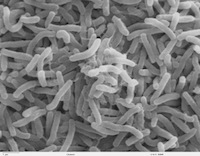 |
| Vibrio cholerae bacteria--Courtesy of Dartmouth College |
In a huge Bangladeshi trial, Shanchol, Sanofi ($SNY) company Shantha Biotechnics' affordable cholera vaccine, prevented almost 40% of cholera cases. When combined with increased hand-washing, the vaccine prevented 45% of cases.
The study, published online in The Lancet on Wednesday, involved more than 268,000 people who were split into three groups. The first received the vaccine, the second were encouraged to wash their hands in addition to receiving Shanchol, and the third had no intervention.
The WHO estimates that there are 3 million to 5 million cases of cholera each year, and up to 100,000 to 200,000 deaths. There are two commercially available cholera vaccines: Shanchol, which costs about $1.85 a dose and Dukoral, which requires 150 mL of clean water for administration and can cost two to five times more per dose than Shanchol. It is used for travelers. While both have been on the market for years, they had been untested in countries where cholera is endemic. Valneva signed a €45 million deal in January to acquire Dukoral from Johnson & Johnson ($JNJ).
"Our findings show that a routine oral cholera vaccination programme, in cholera-endemic countries, could substantially reduce the burden of disease and greatly contribute to cholera control efforts," said Dr. Firdausi Qadri, the lead researcher from the International Centre for Diarrhoeal Disease Research Bangladesh, as quoted by the BBC. But, he continued, while vaccines have their place in controlling cholera, the silver bullet is clean water and adequate sanitation. The WHO recommended the Bangladeshi trial.
 |
| Hilleman Laboratories CEO Davinder Gill |
And hoping to join the fight against cholera is Merck's ($MRK) Indian JV, Hilleman Labs. In June, it signed joined forces with Sweden's Gotovax to advance its cholera candidate, and in November, inked a deal with Bangladesh-based Incepta and ICDDR,B.
"The plan is to work with ICDDR,B on the clinical side and Incepta on the manufacturing side, and to have a three-way collaboration to make (an affordable vaccine) available in Bangladesh," Davinder Gill, Hilleman CEO, told FierceVaccines in March. The company hopes to complete clinical development in 2017 and to register for licensure in 2018.
The manufacturing process, according to Gill, is much simpler and more cost-effective than that of Shanchol. He'd like to produce a "sustained supply of this vaccine for stockpile purposes and vaccination to begin in countries like Bangladesh … and other parts of the world." And, by virtue of its design, he says he can severely undercut the $1.85 per dose price that the two-dose Shanchol demands.
- here's the study abstract
- read more from the BBC